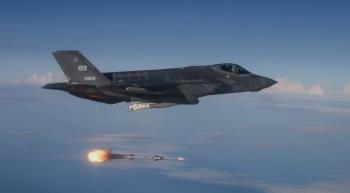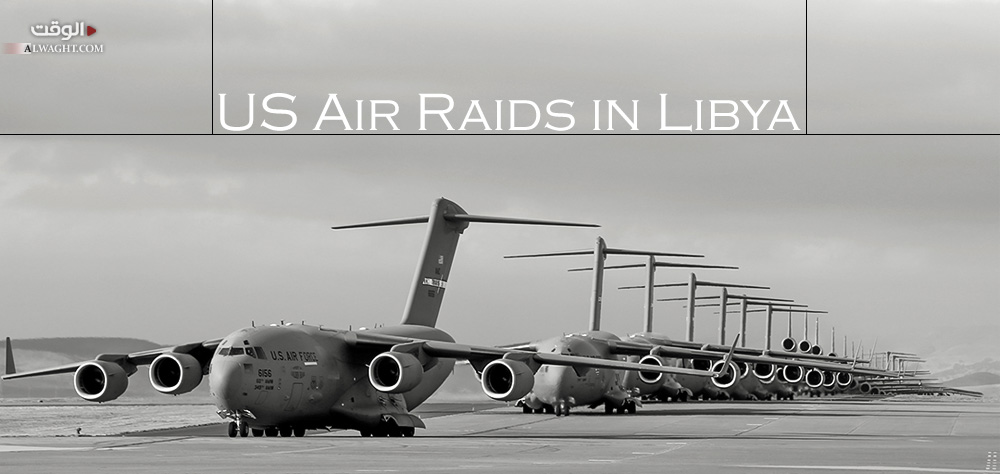Alwaght- The US has launched anti-ISIS airstrikes in Libyan city of Sirte on Monday, August 1, after the US Secretary of Defense Ashton Carter recommended that the American President orders first air raids at the terrorist group's positions in the North African country.
Following the US attack on Libya in 2011, ISIS managed to seize control of Sirte and get a toehold in the oil-rich country as the nation was immersed in chaotic conditions as a result of fall of former dictator Muammar Gaddafi and subsequent vacuum of power. After Raqqa in Syria and Mosul in Iraq, Sirte is the third most important stronghold of the terrorist group. Liberation of the city which is located halfway between two significant cities of Tripoli and Benghazi can be considered a crushing blow dealt to ISIS terrorists.
Why is US launching airstrikes?
Concerning the reasons pushing Washington to move to launch attacks at ISIS in Libya at the present time, it must be noted that the US sees itself as the manager of the world order so it reserves for itself the right to, by itself, move to strike the terrorist group in the Libyan city.
Another reason for Washington's intervention in Libya against ISIS is that the US has been brought under fire by many countries and even the sides of Libyan civil war because following helping bringing down Colonel Gaddafi it left Libya for itself and actually made no moves to assist the Libyans to rebuild their government in post-revolution period. The US President Barack Obama is said to have started the air raids in Libya to save face and respond to the criticism by different sides.
Another significant point that is worth considering is that the former US Secretary of State Hillary Clinton under Obama administration had a key role in engaging the US in airstrikes in Libya in 2011, and removing the Libyan leader. Being the Democrats' nominee for the US presidential election in November, Clinton has been under harsh criticism of the US internal groups as they argue that the current chaotic circumstances in Libya are a result of her mismanagement and miscalculated decisions. Therefore, President Obama who is passing his closing months of presidency has begun the raids in Libya against the terrorists in a bid to ease the disparagement against Clinton and thus have her back for the upcoming presidential race.
Moreover, Washington is launching airstrikes in Libya against ISIS, aiming to have a hand in process of government formation in Libya and backing it up in the future. In fact, the US wants to make the upcoming Libyan government feel owing its establishment to the West, something that would result in its dependence the US and the West.
Consequences
The attacks would have consequences especially inside Libya. The US airstrikes in Sirte are believed to push advances by the Libyan forces, as they would break resistance of ISIS in the face of Libyan forces.
That being said, being defeated in Sirte, some members of this group have fled to the southern regions of Libya in hope of continuing their terrorist operations from there, which due to the lack of government control in those areas is more suited for them. In such circumstances, and considering the history of conflicts with ISIS terrorists in the city of Fallujah in Iraq, there might be an increase in suicide attacks and other terrorist operations such as car bombings in Libya. On the other hand, since many of the government affiliated forces are members of the Fajr Libya militia from Misrata, and since the two cities of Sirte and Misrata have had a series of issues and problems with each other in the past, dominance of Sirte by Fajr Libya militia will increase the conflicts between bigot groups of Sirte and Government of National Accord forces.
Moreover, presence of foreign troops in Libya is another problem. Due to Libyan public opinions' anti-West sentiments, who are proud of fighting against the West in the past, the Libyan society will show more resistance against the Government of National Accord that is supported by the West. The presence of foreign troops in Libya will especially affect and help the paramilitary and political groups that oppose the Government of National Accord, and consider them as the West’s puppets in Libya. This will greatly affect the attempts over the past two years to establish a national unity government, and will cause problems for the state-building process.
Internationally, the US anti-ISIS air campaign in Libya can send a message to the European countries, telling them that just like the past they need Washington in their security provision process. In fact, Washington wants to get across the idea to Europe that despite closeness of Libya to Europe and the security troubles that could be posed by radical groups present in Libya, EU is unable to obliterate the extremist groups in Libya and so it is the US that plays the role of supporter of Europe and it provides its security.
The US and European countries are well aware that deploying ground forces to Libya means jumping in a huge quagmire that would cost them high. So, it is expected that the West prompts its military intervention in Libya through conducting air raids and also sending limited number of ground and intelligence forces to the battlefields in Libya. Although the Libyan government has said that the strikes were limited, it appears that the US and the West, taking cue from their intervention in Afghanistan, would continue their presence in Libya and their air operations in the North African country even in upcoming years under the excuse of fighting the radical groups and ISIS.
Given abovementioned challenges, it seems that the process of forming a stable and powerful central government in Libya will continue to face major obstacles. Naturally, with the current state of matters that is present in Libya, whether adventitious or structural, formation of a central and stable government in Libya, at least in the next five years, is not possible and this country will remain on the verge of turning into a failed state, whilst national security, as the first cornerstone of progress will turn into an unobtainable commodity.



























